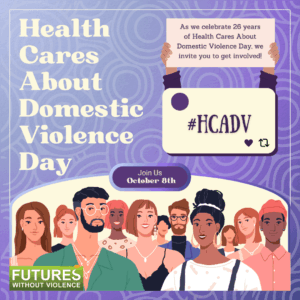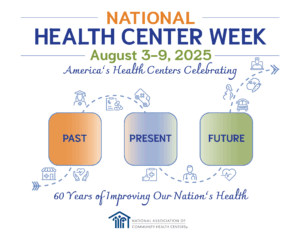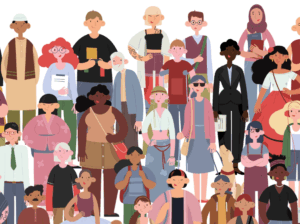
How Community Health Centers Can Address Domestic Violence
By: Kimberly S.G. Chang, MD, MPH (Lead Author) and Anna Marjavi, Kenede Pratt-McCloud, Jake Sese, MPH,

By: Kimberly S.G. Chang, MD, MPH (Lead Author) and Anna Marjavi, Kenede Pratt-McCloud, Jake Sese, MPH,

Celebrating 60 Years of Health Centers and their Partners! Sixty years ago, the first Health Centers (HCs) were founded to provide healthcare to underserved communities. And 45 years ago, Futures

Recognizing Health Center Dedication to Provide Quality Care for Survivors Did you know that 40-50% of people in the U.S. have experienced rape, physical violence and/or stalking by an intimate

As we embark on our sixth year of our project, Health Partners on IPV + Exploitation, we’re proud to reflect on the meaningful progress made alongside health centers (HCs) and

Authors: Dana Trampas, Kimberly Chang, MD, MPH, Anna Marjavi October 1, 2024 In a bustling health center (HC), Nurse Maria meets a patient named Ana during a routine visit. At

AUTHORS: Yuriko de la Cruz (NACHC) and Anna Marjavi (Director, Health Partners on IPV + Exploitation, Futures Without Violence) October 2, 2023 “Never assume that domestic violence is not affecting

March 17, 2023 In 2020, federal pandemic legislation required states to ensure “continuous coverage” for most people enrolled in Medicaid during the Public Health Emergency (PHE). In exchange, states received

From Alianza Nacional de Campesinas and Health Partners on IPV + Exploitation March 27, 2023 On any given morning, Irma Durand drives the roads and fields in Homestead, Florida. They

November 3, 2022 At a clinic embedded within a drop-in center in downtown Pittsburgh for adolescents and young adults who are unstably housed, clients can receive routine care and preventive

As we enter our third year of running Health Partners on IPV + Exploitation, an NTAP funded by HRSA’s Bureau of Primary Health Care (BPHC), that works with health centers

March 1, 2022 “One day, I was with a patient that I knew very well. She was an outgoing girl, doing really well. She was in a new relationship

October 6, 2021 By: Anna Marjavi, Health Partners on IPV + Exploitation, and Kimberly S.G. Chang, MD, MPH, Asian Health Services 15,929. This is the 2020 UDS number of patients